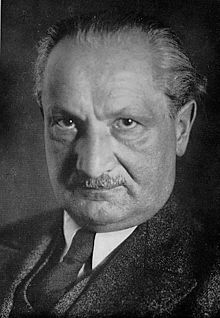Martin Heidegger Quotes
We ourselves are the entities to be analyzed
The most thought-provoking thing in our thought-provoking time is that we are still not thinking.
Making itself intelligible is suicide for philosophy. Those who idolize "facts" never notice that their idols only shine in a borrowed light.
If I take death into my life, acknowledge it, and face it squarely, I will free myself from the anxiety of death and the pettiness of life - and only then will I be free to become myself.
Everywhere we remain unfree and chained to technology, whether we passionately affirm or deny it.
Every man is born as many men and dies as a single one.
Language is the house of the truth of Being.
Transcendence constitutes selfhood.
Why are there beings at all, and why not rather nothing? That is the question.
Where is the boundary of the body? “Every body is my body.”
The human being is not the lord of beings, but the shepherd of Being.
In order to remain silent, existence must have something to say.
To think is to confine yourself to a single thought that one day stands still like a star in the world's sky.
From our human experience and history, at least as far as I am informed, I know that everything essential and great has only emerged when human beings had a home and were rooted in a tradition.
Philosophy will not be able to effect an immediate transformation of the present condition of the world. This is not only true of philosophy, but of all merely human thought and endeavor.
The Geschick of being: a child that plays... Why does it play, the great child of the world-play Heraclitus brought into view in the aiôn? It plays, because it plays. The "because" withers away in the play. The play is without "why." It plays since it plays. It simply remains a play: the most elevated and the most profound. But this "simply" is everything, the one, the only... The question remains whether and how we, hearing the movements of this play, play along and accommodate ourselves to the play.
Anxiety is there. It is only sleeping. Its breath quivers perpetually through Dasein [human existence], only slightly in what makes us ‘jittery,’ imperceptibly in the ‘Oh, yes’ and the ‘Oh, no’ of men of affairs; but most readily in the reserved and most assuredly in those who are basically daring.
Why is love beyond all measure of other human possibilities so rich and such a sweet burden for the one who has been struck by it? Because we change ourselves into that which we love, and yet remain ourselves. Then we would like to thank the beloved, but find nothing that would do it adequately. We can only be thankful to ourselves. Love transforms gratitude into faithfulness to ourselves and into an unconditional faith in the Other. Thus love steadily expands its most intimate secret. Closeness here is existence in the greatest distance from the other- the distance that allows nothing to dissolve - but rather presents the “thou” in the transparent, but “incomprehensible” revelation of the “just there”. That the presence of the other breaks into our own life - this is what no feeling can fully encompass. Human fate gives itself to human fate, and it is the task of pure love to keep this self-surrender as vital as on the first day.

